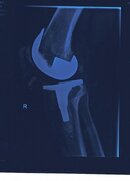You may want to contact boulderjohn (
View Profile: boulderjohn - ScubaBoard - Scuba Diving Forum - Diving Social Network), one of our board moderators, for his experience with KR.
No need for the contact--I'll jump in.
Let me start with saying that your title of the thread is wrong. It should be
Knee Replacement 
.
I was in pain from traumatic osteoarthritis (injury induced) in my right knee for years. I could not run a step. People could recognize me at a distance from my awkward limp. I actually got serious about diving because that activity was less painful than my other pursuits--even golf. Friends who had had knee replacements told me to get one, but my family doctor was adamantly opposed. I was too young, he said. They wear out in a few years and cannot be replaced more than once, he said. Use a cane or an off-loading brace instead, he said. I finally had the guts to stand up to that advice and get a second, third, and fourth opinion from orthopedists. He relented, and I then went ahead and completed one of the best decisions of my life by having the knee replaced nearly 7 years ago.
Nearly a year after that, I was late for my second dive in Cozumel and was running across the beach to the boat. It dawned on me as I ran--I'm running across a beach! Pain free! Today I don't even give the knee a thought.
My diving is ever so much better. Before surgery, I was pretty much limited to basic flutter kicks. A proper frog kick hurt like Hell. Today I can do all of the kicks without even the slightest hint of discomfort. A while ago I was doing a deep decompression dive, and although I did need help standing up, I walked without pain to the back of the boat while carrying double steel LP 108s on my back, two AL 40s under my left arm, an AL 80 under my right arm, and assorted other gear needed for the dive.
How long will my knee last? I asked my surgeon, and he said he had no idea. He had only been doing knees for 20 years, and only a very small percentage failed during that time. Those were the older models with inferior materials. He used the kind with the removable insert, so when those failed, he just stuck in a replacement part, and there is no limit to the number of times that can be done. I imagine things have only gotten better since then.
You have gotten good advice above about being very serious about your rehabilitation after surgery. Get yourself a good range of motion as soon as you can.




